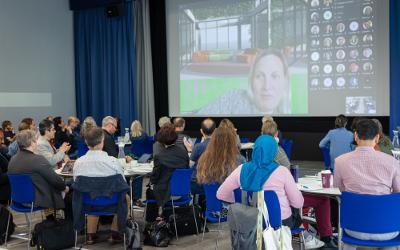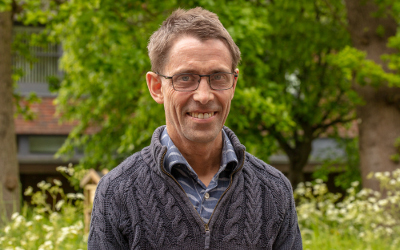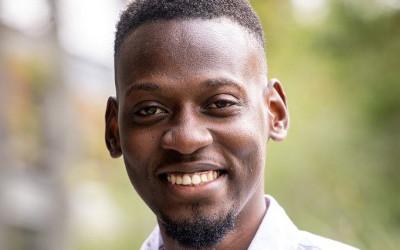OU Sustainability Research Festival 2023 highlights the need for collaboration

Participants in The Open University's (OU) first Sustainability Research Festival highlighted willingness to collaborate as a key requirement to tackle environmental challenges both locally and globally.
Sustainability is one of the OU’s Open Societal Challenges (OSC). The OU’s research in this area supports a more sustainable planet by creating a shared understanding, identifying opportunities, and bringing people together.
The event was an opportunity to hear from OU academics who have submitted challenges around sustainability-related projects globally and to spend time scoping new research ideas.
Collaborating towards Milton Keynes’ sustainability goals
An address from Jennifer Wilson-Marklew, Cabinet member with responsibility for Sustainability, Climate Action and Transport at Milton Keynes Council, outlined Milton Keynes’ sustainability goals for carbon neutrality by 2030 and being carbon negative by 2050 and the challenges within these aspirations.
“Because so much of what we want to achieve is out of our hands, which is why working with external partners is really, really key to enable us to deliver,” said Councillor Wilson-Marklew
From local to international OU research in sustainability
OU Projects presented on the day were:
-
Combatting the climate crisis on campus
Planting began in May 2023 on the OU’s campus, a part of which has become the Weston Open Living Lab.
The OU’s Open Societal Challenges programme and the Garfield Weston Foundation are supporting the Weston Open Living Lab project. Led by Dr Kadmiel Maseyk, Senior Lecturer in Environmental Sciences, it will plant 2,000 native trees and shrubs during the next 12 months, regenerating habitat and biodiversity across a two-hectare area floodplain, roughly the size of two professional football pitches, next to the River Ouzel on the OU’s Milton Keynes campus
They will install state-of-the-art sensors to monitor how the area’s carbon capture capacity, habitat and biodiversity develop as it transfers from grassland to woodland, together with vital environmental, soil and water quality measurements. When fully developed, the researchers hope the restored woodland could capture up to 20 tonnes of atmospheric carbon dioxide annually. That’s enough to remove the carbon emissions produced by 12 UK average cars or the total carbon footprint of seven average UK homes every year.
The researchers will use this data in their research and teaching with OU students, share it with the broader research community, and create online education resources. They will also invite local communities and school pupils to visit to learn about nature recovery and biodiversity and participate in citizen science projects.
Watch the video where Dr Maseyk explores why collaboration is key to addressing social and environmental issues:
And, so it's going to require interaction and knowledge that comes from the social side.
It comes from the environmental side.
It comes from the physical side.
And even within a discipline, there's no one person who is able to address these challenges because, even within a discipline, there is a range of opinions, a range of expertise, a range of ideas.
So, we need to have that diversity of opinions and ideas and expertise to address these issues, because they're very complex and they're very interrelated.
Universities, the OU and universities in general I think, have a very important role to play both because of the well, the traditional two main roles in terms of Education and Research obviously, but also increasingly bringing our knowledge to society and engaging with society and taking ideas forward.
And, so therefore the both in terms of educating the next Generations about bringing the awareness to Future Generations this is a key factor.
This is where it starts again, this is the root of all change.
And, finding the solutions.
So, the research that we do at the University is key for this.
So, the research that we then take to our students in our important role in teaching but then of course, more broadly engaging with our wider society to share that knowledge and share that understanding and potential solutions, or taking research out into those areas we might be in a better place to deliver it more broadly than we are.
And so, the research I do addresses various issues relating to climate challenges and the impact of the changing climate on ecosystems.
And importantly, there's a new project that we are starting here at The Open University.
The purpose of this project is to is for education and engagement around these twin issues of the biodiversity crisis and the climate crisis.
So, we want to develop a platform where we are going to be gathering a lot of data a lot of information a lot of knowledge and then translating this into tools and resources and um open resources that of course that we will use with our students and through our modules.
So, this will have a lifetime of the next decade, but also that we will turn into material that we'll be able to use through our public engagement activities and get community groups involved in schools involved so that we can take the expertise that is with within the OU within our team and take this out and hopefully educate Beyond just our students but also the wider community.
-
Engaging internationally and through the Nations
Dr Andrea Berardi, Senior Lecturer in Environmental System, presented how he and his team are collaborating with Guyana’s Indigenous Macushi people and mission-driven technology start-up, Waterware Collective, to combat environmental harm.
He presented the Surface Water Integrated Monitoring (SWIM) project, which is supported by the OU’s Open Societal Challenges programme. It enables the community to remotely monitor water quality in the vast southwestern Rupununi region they call home, using sustainable, low-cost and locally designed technologies and materials, such as bamboo for casings. They are going to roll out this approach across Guyana.
Julia David, Partnerships Manager, OU Wales presented the challenge: An equitable response to the climate crisis for vulnerably housed people and communities facing poverty in Wales. She is working with academics and seeking to collaborate with external partnerships.

Speaking at the event, Professor Neil Edwards, the OU’s incoming Lead for the Sustainability OSC said:
“Collaboration is really critical because the whole point about sustainability is it really brings in a huge range of different disciplines, so it is not just about understanding the physics of the environment, you’ve got to understand how people interact with the environment and how people interact with each other. The OU has a crucial role in this.”
The OSC approach underpins the OU’s latest research strategy which runs from 2022-2027 and centres on a programme to address these three crucial challenges facing people across the globe: Sustainability, Tackling Inequalities and Living Well.
You may also be interested in:
Quarterly Review of Research
Read our Quarterly Review of Research to learn about our latest quality academic output.

Contact our news team
For all out of hours enquiries, please telephone +44 (0)7901 515891
Contact details